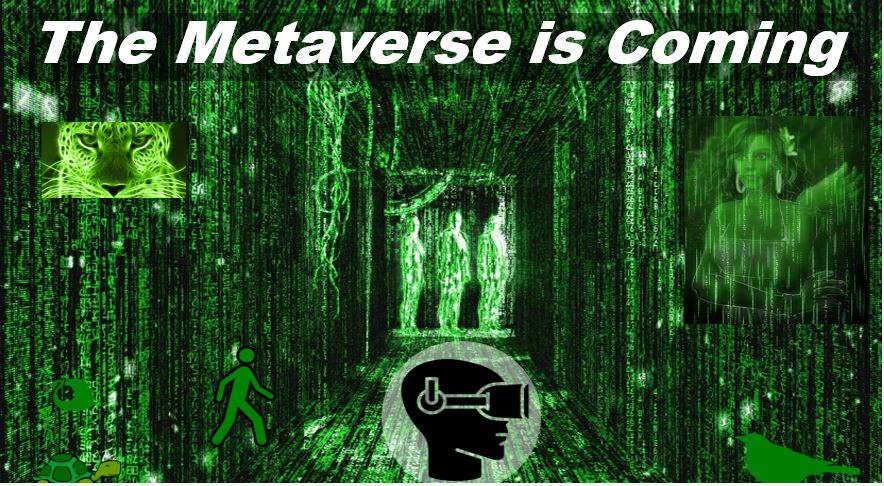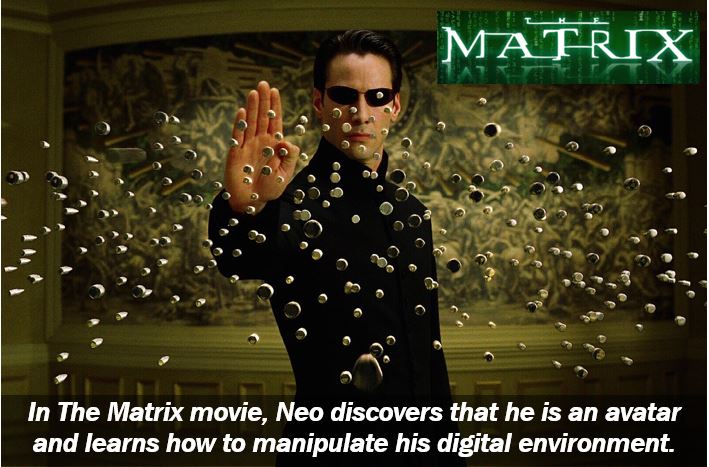What is the Metaverse? Definition and examples
The Metaverse is the next milestone of modern technology, which started with those cumbersome mobile phones in the 1980, gradually evolved to conveniently sized smartphones, the Internet, virtual reality (VR) headsets, and their augmented reality (AR) counterparts.
The Metaverse promises an integrated experience that transcends traditional digital boundaries, enabling seamless transitions between different virtual environments and real-world settings.

The metaverse – much more than a super VR
Some people see the Metaverse as a super souped-up version of virtual reality. This is partly true, but only to a very small extent – there is much more to the Metaverse than that.
It will eventually become a virtual reality that includes the whole of the Internet. The term metaverse refers to the Internet as a whole, and not just virtual worlds. Add to this the whole spectrum of augmented reality.
Imagine rather than being on a computer, you are within its digital environment. In the Metaverse, you experience things by being inside. VR today is mainly used for gaming. The metaverse, on the other hand, could be your workplace, a music concert, a trip to the cinema, a play, a place to go on vacation, or simply somewhere to hang out with others.
A breakdown of the term ‘metaverse’
‘Metaverse’ is a combination of the prefix ‘meta’ and the stem ‘verse.’
META comes from the Greek prefix ‘meta-‘ which means ‘beyond,’ while VERSE is short for ‘universe.’
Therefore, ‘The Metaverse’ refers to a universe that is beyond our own. In other words, it transcends or goes beyond our current conception of reality.
The origin of the term ‘Metaverse’
Even though Mark Zuckerberg shot the term ‘metaverse’ into the mainstream, he did not invent it.
American writer Neal Stephenson first coined the term ‘metaverse’ in 1992 in his science fiction novel “Snow Crash.” In the novel, he described it as a virtual reality-based successor to the Internet.
The notion of what the metaverse is or could be can be traced back to the video games of the 1980s.
The following quote comes from xrtoday.com:
“Since the late 1970s, those belonging to the technology community have imagined the internet and its futuristic successor – which is a conglomeration of all the digital worlds and objects built across the decades. Now, the metaverse is finally coming into its own.”
“In many ways, Facebook and its competitors aren’t building or inventing the metaverse – they are discovering it.”
The metaverse and your avatar
As you use it, you will probably have an avatar. An avatar is a digital representation of a particular person, which in this case would be you. Your avatar interacts with those of other people.
You exist inside a digital or virtual universe where you could eventually do everything you currently do in the real world, but with your avatar. All your experiences happen through this avatar. You will probably also be able to experience things that would be impossible in real life.
Science fiction to science fact

Until very recently, the metaverse was something we could only grab a glimpse of in science fiction movies. In the film The Matrix, which came out in 1999, the main character Neo, played by Keanu Reeves, discovers that he exists in a metaverse.
The concept of experiencing life through a digital representation of oneself became a popular talking point after the movie came out. The Matrix 2, 3, and 4 then followed.
Bear in mind that what one sees in The Matrix is technology that probably won’t be around for at least 100 years. The technology will gradually evolve and providers will find out what people prefer, what is possible and affordable, and then which way to move forward.
Why is the metaverse such a big thing now?
Over the past couple of decades, we have heard about various different digital technologies that seemed to show promise. However, they mostly died away after a couple of years.
This does not seem to be the case with the idea of a metaverse. Very wealthy investors are excited about its potential as are several giant tech firms. They believe that a major milestone is here, and nobody wants to be left out.
BBC News made the following comment regarding the metaverse and its potential:
“There’s also a feeling that for the first time, the technology is nearly there, with advancements in VR gaming and connectivity coming close to what might be needed.”
Facebook changes name to Meta
Facebook announced at the end of October 2021 that it was changing the name Facebook Inc. to Meta Platforms Inc. Meta is short for Metaverse. The company will be informally known as Meta.
In a press release, Facebook (Meta) wrote:
“The metaverse will feel like a hybrid of today’s online social experiences, sometimes expanded into three dimensions or projected into the physical world. It will let you share immersive experiences with other people even when you can’t be together — and do things together you couldn’t do in the physical world.”
“It’s the next evolution in a long line of social technologies, and it’s ushering in a new chapter for our company.”
Mark Zuckerberg, CEO and co-founder of Facebook (Meta), wrote the following in a newsletter on October 28, 2021:
“In the metaverse, you’ll be able to do almost anything you can imagine — get together with friends and family, work, learn, play, shop, create — as well as completely new experiences that don’t really fit how we think about computers or phones today.”
In a Meta press release on May 9th, 2023, Rob Sherman, Vice-President for Policy, wrote:
“While the metaverse is still in the early stages of development, it’s already possible to see its potential in areas like education, gaming, wellness and commerce. As metaverse technologies are more widely adopted more economic opportunities will emerge such as opening up new markets and business models, creating better ways of working and transforming training and development.”
This emerging ecosystem is anticipated to significantly influence the gig economy, offering novel freelance opportunities and digital entrepreneurship ventures across its expanding platforms.
The origin of the term ‘Metaverse’
Even though Mark Zuckerberg shot the term ‘metaverse’ into the mainstream, he did not invent it.
The term has been around since the early 1990s, while the notion of what the metaverse is or could be can be traced back to the video games of the 1980s.
The following quote comes from xrtoday.com:
“Since the late 1970s, those belonging to the technology community have imagined the internet and its futuristic successor – which is a conglomeration of all the digital worlds and objects built across the decades. Now, in 2021, the metaverse is finally coming into its own.”
“In many ways, Facebook and its competitors aren’t building or inventing the metaverse – they are discovering it.”
Compound phrases with ‘metaverse’
A compound phrase is a term consisting of two or more words. ‘Metaverse Education,’ for example, is a compound phrase. Below, you can see some compound phrases containing the word ‘metaverse,’ their meanings, and an example of each one used in a sentence:
-
Metaverse Platform
Software or services enabling metaverse experiences.
For example: “The latest metaverse platform allows for more realistic virtual interactions.”
-
Metaverse Economy
Economic activities within the metaverse, including trade in virtual goods.
For example: “Entrepreneurs are finding lucrative opportunities in the metaverse economy.”
-
Metaverse Experience
What users encounter while engaging with the metaverse.
For example: “Her metaverse experience was enhanced by the addition of interactive elements.”
-
Metaverse Development
Building the metaverse’s infrastructure and content.
For example: “He is actively involved in metaverse development, focusing on user-friendly interfaces.”
-
Metaverse Real Estate
Virtual spaces users can buy and use in the metaverse.
For example: “The sale of metaverse real estate is becoming increasingly common as the virtual world expands.”
-
Metaverse Education
Learning and teaching within the metaverse environment.
For example: “Metaverse education is revolutionizing how we approach distance learning.”
-
Metaverse Events
Social and professional gatherings held in the metaverse.
For example: “The conference will be one of the biggest metaverse events this year.”
-
Metaverse Governance
Rules and policies regulating the metaverse.
For example: “Effective metaverse governance is key to maintaining a safe and inclusive environment for all users.”
3 Videos
These three educational videos, from our sister YouTube channel – Marketing Business Network, explain what ‘Meta,’ ‘Virtual Reality (VR),’ and ‘Augmented Reality (AR)’ are using simple, straightforward, and easy-to-understand language and examples.
-
What is the Metaverse?
-
What is Virtual Reality (VR)?
-
What is Augmented Reality (AR)?

